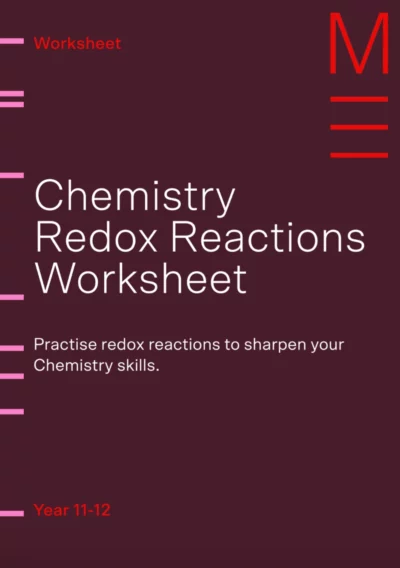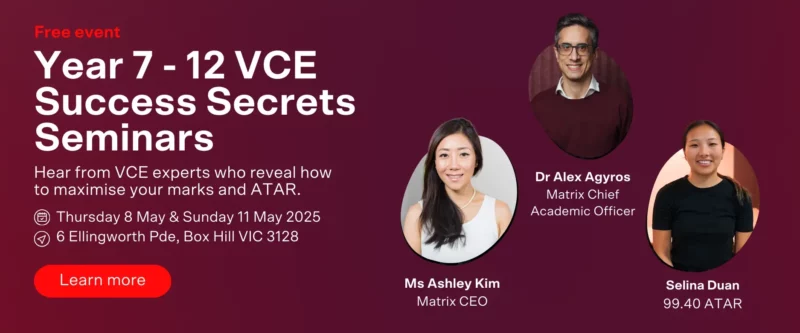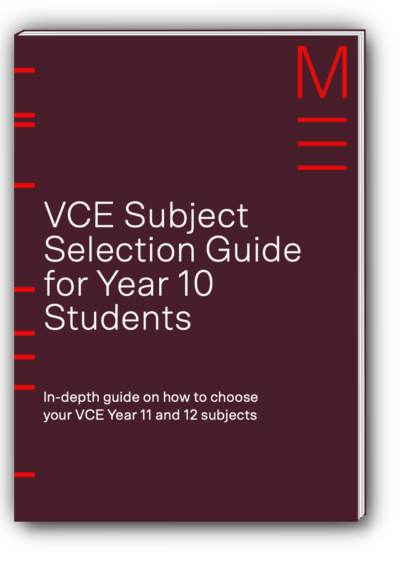Welcome to Matrix Education
To ensure we are showing you the most relevant content, please select your location below.
Select a year to see courses
Learn online or on-campus during the term or school holidays
Learn online or on-campus during the term or school holidays
Learn online or on-campus during the term or school holidays
Learn online or on-campus during the term or school holidays
Learn online or on-campus during the term or school holidays
Learn online or on-campus during the term or school holidays
Learn online or on-campus during the term or school holidays
Get HSC exam ready in just a week
Select a year to see available courses
Science guides to help you get ahead
Science guides to help you get ahead
In this article, the Matrix Science team breaks down what to expect and how to prepare for the VCE Sciences. We explore the key topics covered in Year 11 and 12!

Join 75,893 students who already have a head start.
"*" indicates required fields
Up until the end of Year 10, all students study the same Science syllabus. Its goal is to familiarise students with the foundations of Biology, Chemistry, Earth and Space Science, and Physics.
In addition, students learn the broader scientific skills of how to investigate hypotheses, solve problems, and communicate their findings.
Once you reach Year 11, you can focus on the subjects that you are truly passionate about. Even if you don’t plan to study them in university, the VCE study designs let you explore topics in more depth.
Look at the VCE Science study designs early on to understand the syllabus and assessments for each subject. In Year 11 and Year 12, you’ll expand your knowledge and learn about key scientific discoveries, current research, and future innovations.
Sharpen your skills with challenging redox problems and step-by-step explanations! Fill out your details below to get this resource emailed to you. "*" indicates required fields
Download your free Chemistry Redox Reactions Practice Worksheet

Download your free Chemistry Redox Reactions Practice Worksheet
In this article, we will look at the Year 11 and 12 Science study designs. We will also discuss the VCE Science pathways and how to get ready for VCE Science.
In this guide, you will find:

VCE offers four main science subjects:
Each VCE Science pathway requires different skills and study techniques. The key to success is choosing wisely based on your interests and strengths. As these VCE subjects are often heavy on School-Assessed Coursework, balancing practical work with theory is crucial for success.
In Year 11 and 12, science subjects will go from exploring basic concepts to more complex models and theories that explain real-world phenomena. The focus shifts to specialised topics that deepen your understanding of key scientific principles.
For example, VCE Physics goes deep into:
Throughout most VCE Science subjects, mathematical modelling becomes more advanced. You’ll work with equations, graphs, and vectors to solve problems, making Science a great complement to VCE Mathematics.
For both Year 11 and 12, hands-on experiments are a core part of School-Assessed Coursework.
The goal is to connect theory to real-world applications. By conducting investigations, you’ll develop critical thinking, problem-solving, and communication skills—all essential for future studies or careers in science, engineering, and technology.
To pick the right VCE Science pathway, consider:
Read Which Science Subject Should I Choose for VCE to learn more about choosing the right Science subject for you.

In-depth guide on how to choose your VCE Year 11 and 12 subjects.

Fill out your details below to get this resource emailed to you.
"*" indicates required fields
If you want to prepare for VCE Science, follow these tips to get ahead:
—
Overall, Year 11 and 12 Sciences challenge you to think critically, use advanced mathematical skills, and apply your knowledge to theoretical and practical problems.
The subjects are more complex than in earlier years, requiring detailed analysis and a strong focus on practical applications. VCE Science can prepare you for a wide range of future pursuits and help you better understand the universe.
Written by Matrix Science Team
The Matrix Science Team are teachers and tutors with a passion for Science and a dedication to seeing Matrix Students achieving their academic goals.© Matrix Education and www.matrix.edu.au, 2023. Unauthorised use and/or duplication of this material without express and written permission from this site’s author and/or owner is strictly prohibited. Excerpts and links may be used, provided that full and clear credit is given to Matrix Education and www.matrix.edu.au with appropriate and specific direction to the original content.